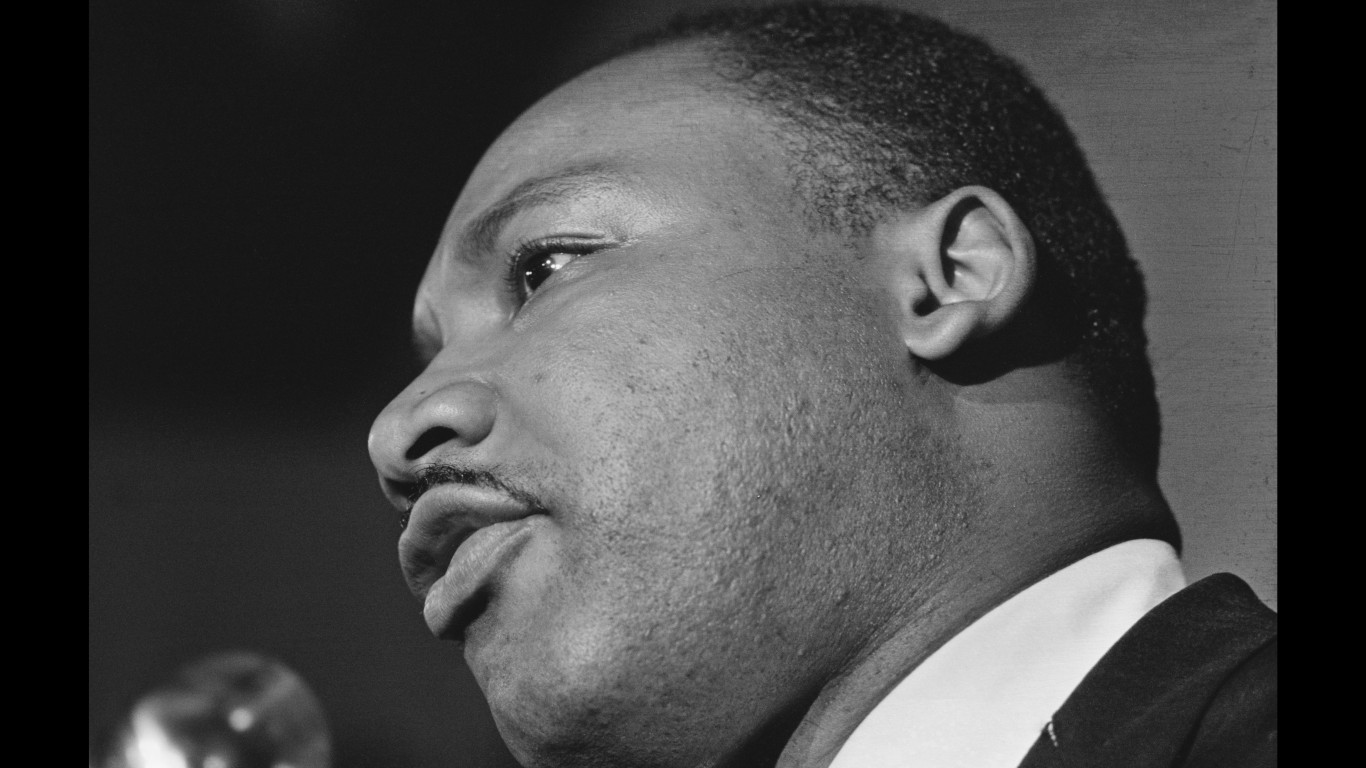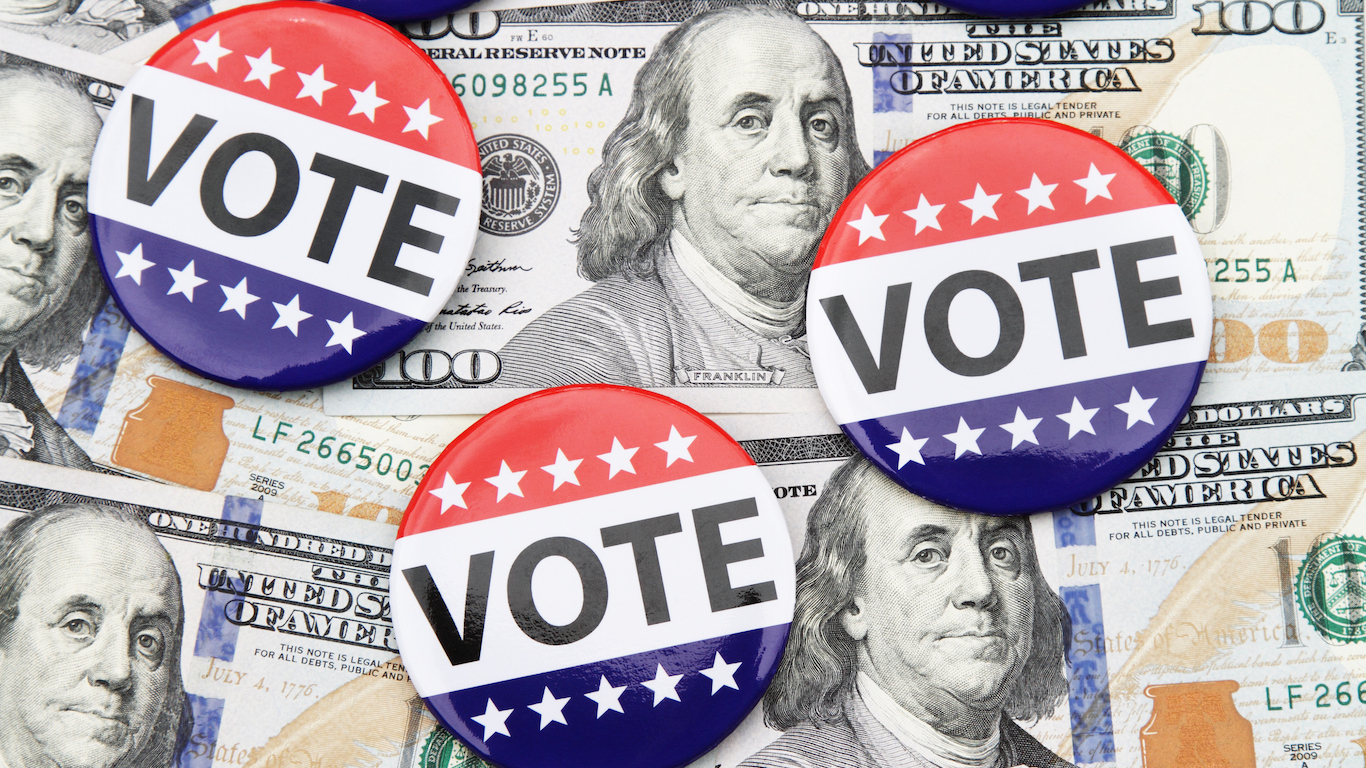
In his 1906 State of the Union address, President Theodore Roosevelt called for a law “prohibiting all corporations from contributing to the campaign expenses of any party.” The rough-riding, trust-busting Republican was such an outspoken critic of concentrated corporate power that he wanted, in his words, to “prohibit in effective fashion all corporations from making contributions for any political purpose, directly or indirectly.”
It is easy to imagine how Roosevelt might have felt about modern day campaign finance, especially following the 2010 landmark Supreme Court ruling in Citizens United v. Federal Election Commission. The ruling extended First Amendment free speech rights to corporations and other associations, including unions and nonprofits, effectively allowing them to spend as much as they desire to support political candidates — as long as their support is independent of the campaigns themselves.
While Roosevelt abhorred the idea of corporations spending money — directly or indirectly — to steer the outcomes of the democratic process, he did not dispute the right of individuals “to contribute as they desire.” This raises an interesting question: When is a donor contributing money as an individual American and when is he or she spending corporate profits to support lawmakers who will craft legislation that benefits the corporation?
Click here to see the largest private donors in American politics.
Since the Citizens United ruling, the answer to this question is: It does not matter. In his concurring opinion in support of granting First Amendment rights to corporations and other associations, the late conservative Associated Justice Antonin Scalia defined the unlimited political contributions of theses groups as “the speech of many individual Americans, who have associated in a common cause.”
His opinion continued, “The association of individuals in a business corporation is no different—or at least it cannot be denied the right to speak on the simplistic ground that it is not ‘an individual American.’”
No matter how you feel about the issue, today’s reality is that individual households can contribute unlimited amounts of money to further political causes, either as “individual Americans” or as heads of multi-billion-dollar hedge funds, casino empires, labor unions, or nonprofit corporations, seeking to influence politicians in ways that favor their interests.
Roosevelt might not have agreed with this blurring of the lines between individuals and corporations, but more than a century after his call to get corporate interests out of politics it is clear which side has won this debate.
Here are the top 10 largest donors over the past two years, where they directed their contributions and their business interests. These include individual contributions to federal candidates, parties, and/or political action committees (PACs) — groups organized privately to raise money for political campaigns.
Methodology
24/7 Wall Street examined campaign-contribution data from the Center for Responsive Politics’ opensecrets.org website and researched the background of the individuals on the list to help illustrate their motives for making these contributions. Total contributions are for the current election cycle, defined as the period between Nov. 9, 2016 (the day after Election Day and start of the campaign season) and Oct. 15 (the most recent Federal Election Commission filing deadline).

10. Timothy Mellon
> Total contributions Nov 9, 2016 — Oct 15, 2018: $10,042,100
> To Dems & Liberals: $2,700
> To Repubs & Conservatives: $10,039,400
> Companies: Investor
Timothy Mellon is the chairman and majority owner of Pan Am Systems Inc., a privately held New Hampshire-based corporation involved in rail-based freight transport, manufacturing, energy, and real estate. Mellon is one of the major single contributors to the Congressional Leadership Fund, a conservative super PAC with close ties to House Speaker Paul Ryan. Its primary aim is getting Republicans elected to the House of Representatives. The fund has amassed about $126 million for this year’s midterm election to flood local airwaves with attacks against Democrats. Mellon has donated $10 million to the fund.
[in-text-ad]

9. Jeff & Mackenzie T. Bezos
> Total contributions Nov 9, 2016 — Oct 15, 2018: $10,186,170
> To Dems & Liberals: $10,800
> To Repubs & Conservatives: $16,200
> Companies: Amazon.com
Jeff Bezos, the world’s richest person, has been largely criticized on numerous occasions for the way Amazon.com Inc., the company he founded and leads, operates. His massive online retail and cloud-computing company has been slammed on different fronts, among other things for the way it treats the company’s low-wage warehouse employees, for drawing at least $1.6 billion in tax breaks and other types of state and local public support, and for using data it collects from its third-party sellers to compete against them. Bezos has been criticized by both the right and the left, which may be why the largest political contribution he has made is to the With Honor Fund, dedicated to electing veterans of whatever party to office.
Bezos recently announced a pay raise for Amazon’s lowest-wage employees following pressure from labor right activists, and his political contributions this year appear to be another act of public goodwill. Most of the money he and his wife Mackenzie have contributed in this election cycle ($10.1 million) has gone to the With Honor Fund, a nonpartisan PAC devoted to backing the nearly 200 recently serving veterans running for office in this election cycle.

8. Kenneth C. & Anne D. Griffin
> Total contributions Nov 9, 2016 — Oct 15, 2018: $10,793,100
> To Dems & Liberals: $0
> To Repubs & Conservatives: $10,793,100
> Companies: Citadel Invest Group/Aragon Global Mgt
During the debates last year over the Republican tax reform plan that slashed corporate and individual top tax rates, multi-billionaire hedge fund manager Kenneth Griffin expressed concern about implementing deficit-ballooning tax cuts during a period of near-full employment and robust economic growth. Though he criticized the move, the head of Citadel, a $28 billion hedge fund, has continued to be been a Republican mega-donor. He also worked as finance chair of the New Republican PAC, focused on getting Florida governor Rick Scott elected to the U.S. Senate, as well as donating $7.5 million to the organization in 2018.
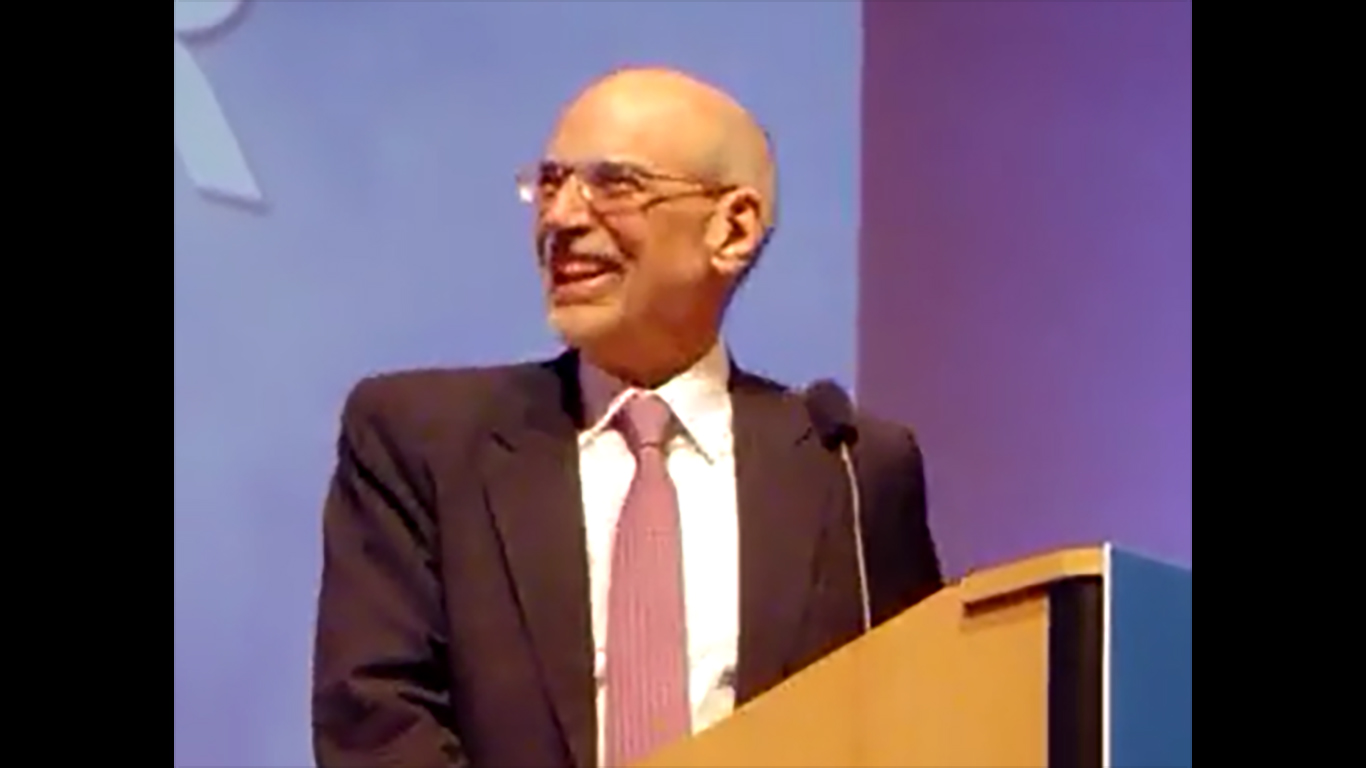
7. Fred Eychaner
> Total contributions Nov 9, 2016 — Oct 15, 2018: $12,160,800
> To Dems & Liberals: $12,160,800
> To Repubs & Conservatives: $0
> Companies: Newsweb Corp
Eychaner is not just the only openly gay donor on this list; but also the poorest, worth a mere $500 million in this club of multi-billionaires. This is largely because he gives away most of his wealth. A staunch backer of LGBT causes, the chairman of Chicago-based Newsweb Corp., a media company that produces alternative and foreign language newspapers and owns TV and radio assets, has donated most of his money in this election cycle to the Senate Majority and House Majority PACs, whose goal is to flip congressional majority back to the Democrats.
Known for being a photo-adverse recluse, Eychaner was a key supporter and fundraiser for Hillary Clinton during her failed bid for the White House in 2016.
[in-text-ad-2]
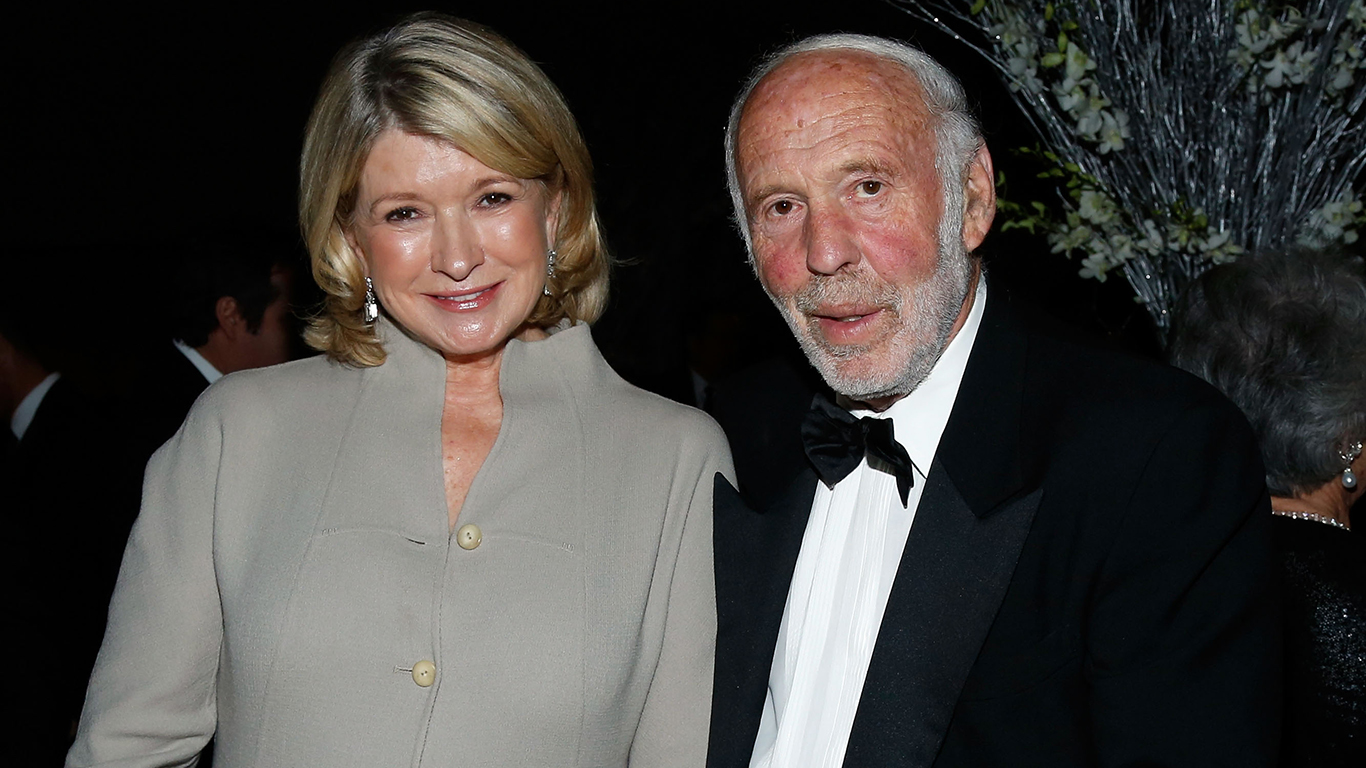
6. James H. & Marilyn H. Simons
> Total contributions Nov 9, 2016 — Oct 15, 2018: $13,942,810
> To Dems & Liberals: $13,922,000
> To Repubs & Conservatives: $0
> Companies: Renaissance Technologies/Simons Fdtn
James Simons might have co-founded quant hedge fund giant Renaissance Technologies with Republican mega-donor Robert Mercer, but the MIT-educated mathematician is one of four liberal billionaires on this list. Simons and his wife, Marilyn, have donated heavily in this election cycle to help get more Democrats elected to office. Like Fred Eychaner, the Chicago media mogul and philanthropist, Simons has sent millions of dollars to the liberal Senate Majority and House Majority PACs. He has also supported PACs aimed at rallying young voters and supporting candidates with progressive views on women’s issues.
Last year, Simons successfully urged Mercer to step down as co-chief of Renaissance Technologies, the world’s most profitable hedge fund, because of Mercer’s financial backing of right-wing news site Breitbart.
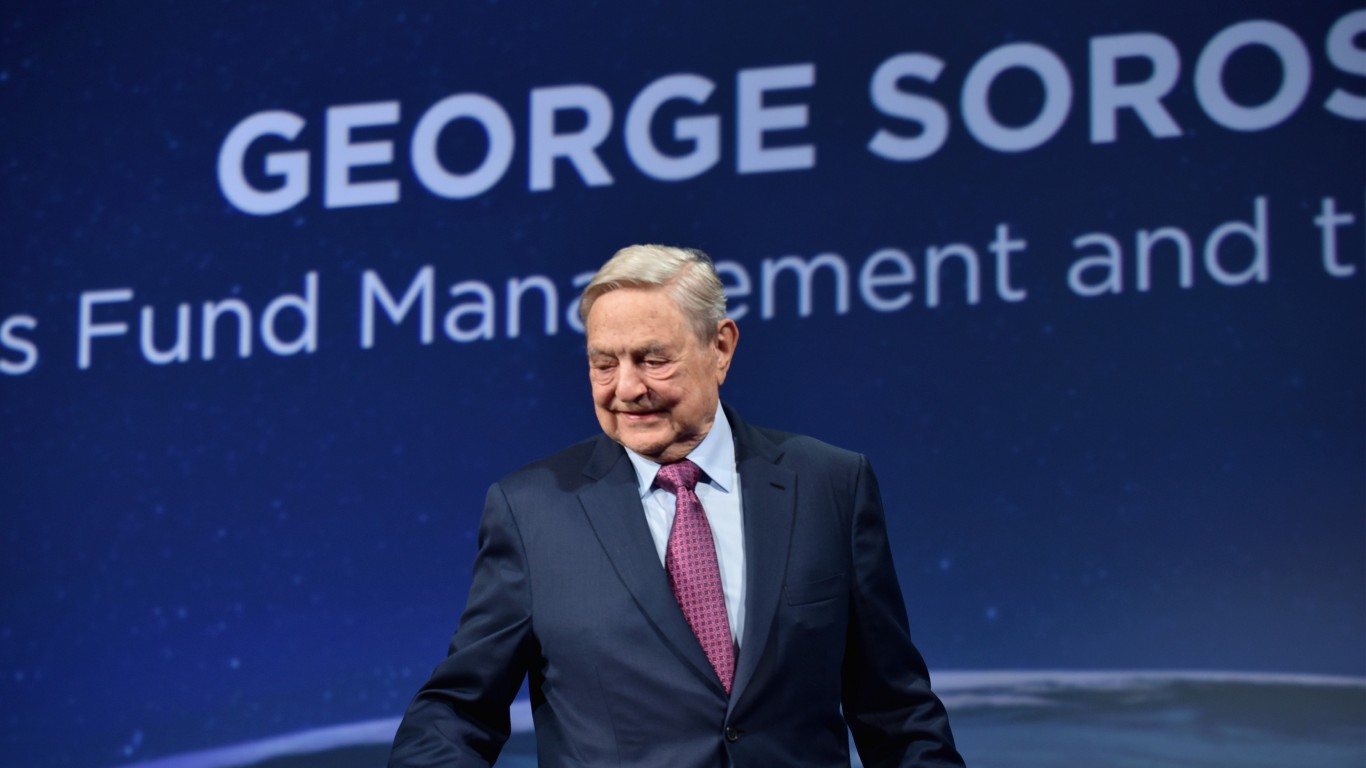
5. George Soros
> Total contributions Nov 9, 2016 — Oct 15, 2018: $15,357,486
> To Dems & Liberals: $15,513,850
> To Repubs & Conservatives: $0
> Companies: Soros Fund Management
Billionaire investor George Soros has long been a target of conservative and Republican ire for his support of progressives through his multi-billion dollar Open Society Foundations. As a Hungarian-born Jew, Soros has also been the target of anti-Semitic smears centered around his investments and aided by age-old stereotypes about Jewish involvement in banking. In 2018, Soros has channeled millions of dollars into more than a dozen progressive PACs, including ones devoted to getting more people of color and women elected to federal office.
[in-text-ad]
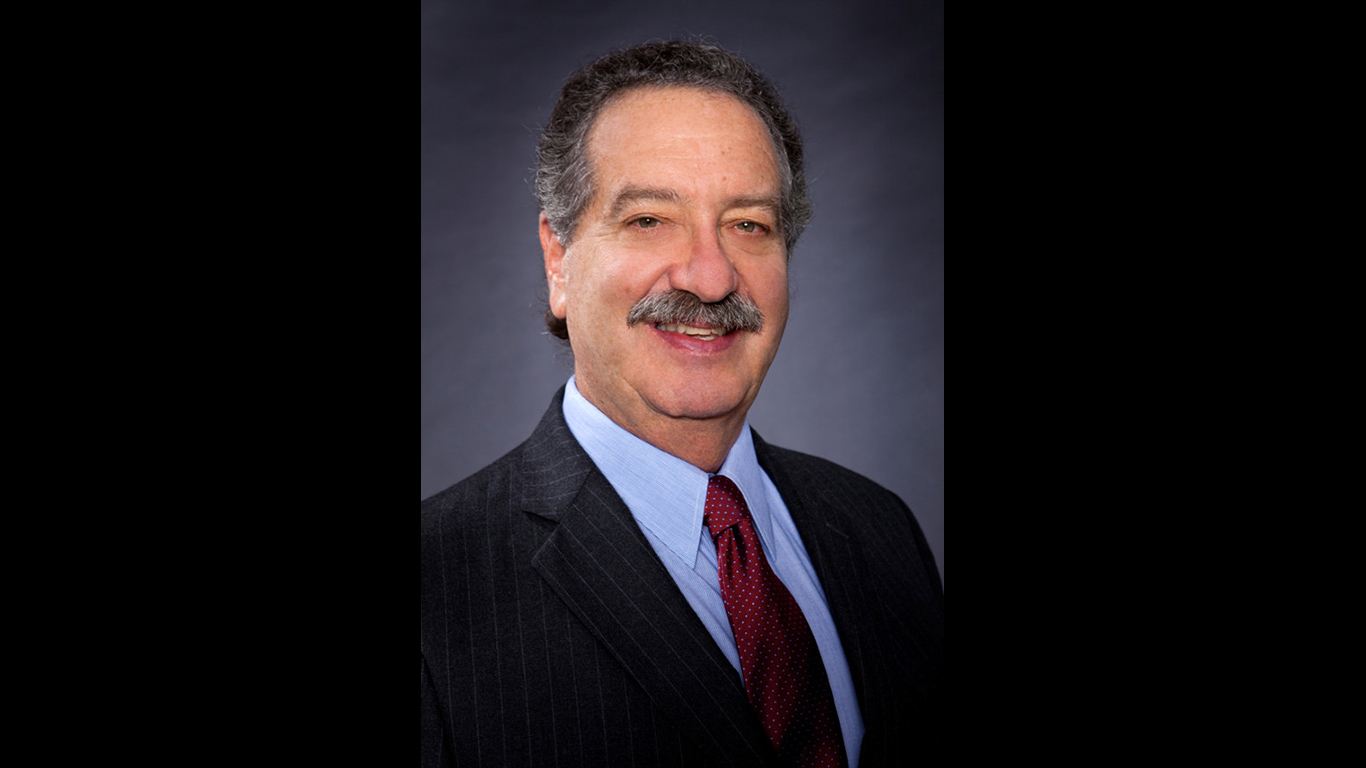
4. S. Donald Sussman
> Total contributions Nov 9, 2016 — Oct 15, 2018: $21,817,700
> To Dems & Liberals: $21,807,300
> To Repubs & Conservatives: $0
> Companies: Paloma Partners
As the largest swing state in the nation, Florida has become a battleground for mega-donors. Billionaire hedge fund manager Donald Sussman has tossed a million dollars toward Democrat gubernatorial candidate Andrew Gillum’s PAC, joining two other liberals on this list — George Soros and Thomas Steyer — in backing a man vying to become the state’s first African-American governor.
Sussman has donated more than $20 million in all in this election cycle to different Democratic groups. Almost half of this money went to the House Majority PAC and Senate Majority PAC, which are trying to retake Congress from the Republicans. Sussman also has donated to different liberal groups, giving $2.5 million to the Women Vote! super PAC, as well as making smaller donations directly to individual Democratic candidates or local Democratic Party chapters in Texas, Wisconsin, Pennsylvania, Kentucky, and elsewhere.
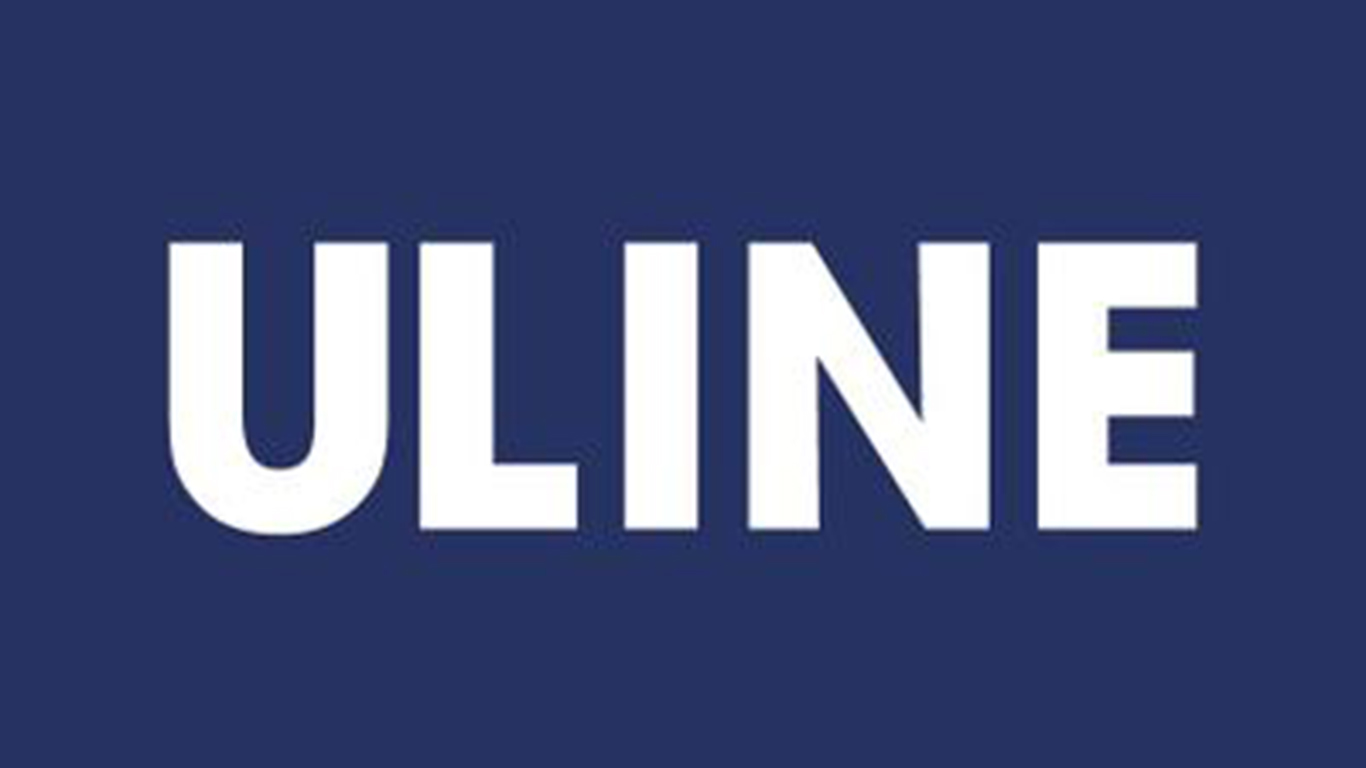
3. Richard & Elizabeth Uihlein
> Total contributions Nov 9, 2016 — Oct 15, 2018: $34,988,529
> To Dems & Liberals: $0
> To Repubs & Conservatives: $34,893,529
> Companies: Uline Inc
Though not as well-known as other mega-donors on this list, Richard Uihlein has quietly risen to become one of the most influential candidate-backers in the country. After his falling-out with Illinois governor Bruce Rauner over abortion, Uihlein gave $2.5 million to Rauner’s GOP primary challenger, Jeanne Ives. She unleashed a series of campaign ads depicting her opponent as excessively liberal on cultural issues, including transgender rights as well as abortion. Ives, however, lost the primary, with Rauner eking out a narrow victory.
The Uihleins, who made their fortune with Uline, a packaging supplies company, have greatly expanded their campaign funding activity in the current election cycle. They have donated to a Tea Party PAC and other hard-conservative groups, and have targeted establishment-backed GOP candidates like Josh Hawley, who is running for the U.S. Senate in Missouri, as well as outsiders like Roy Moore, who lost his primary bid for an Alabama Senate seat following sexual assault allegations.
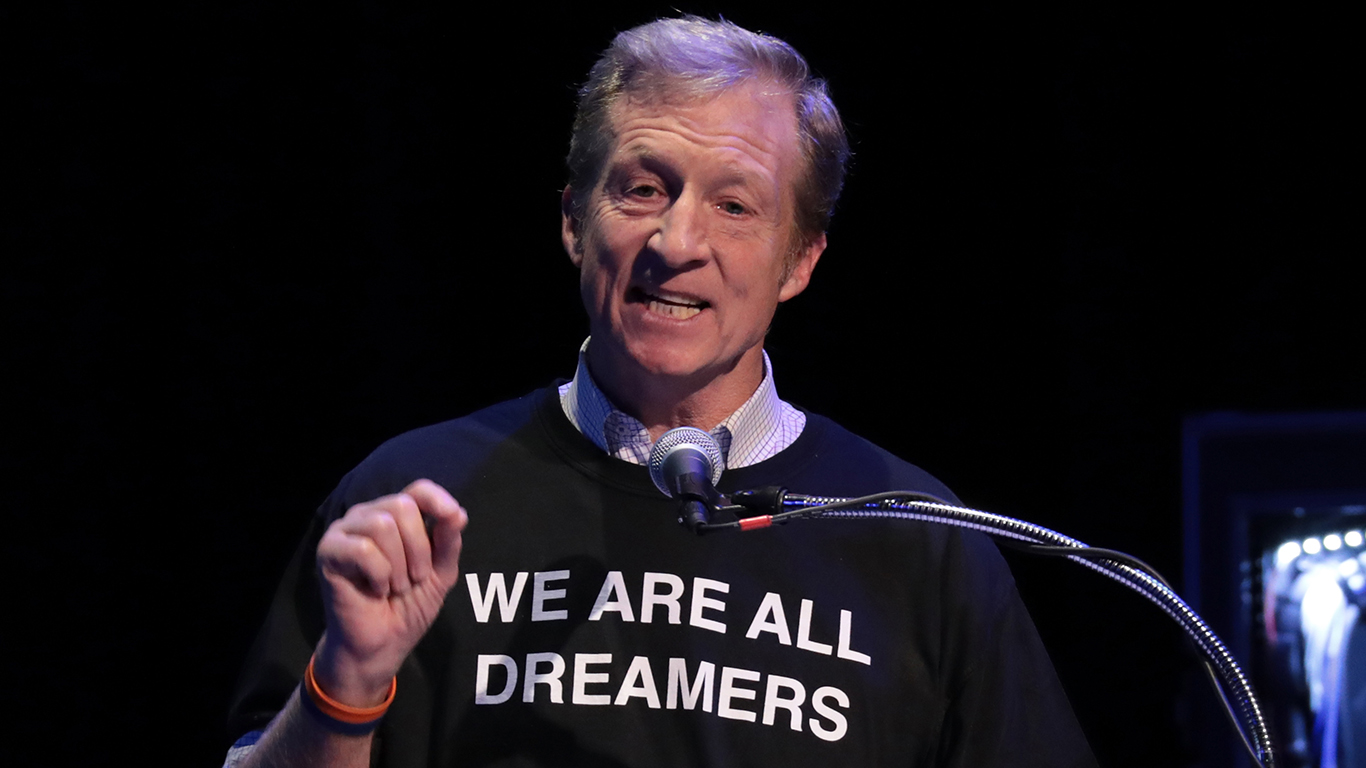
2. Thomas F. & Kathryn Ann Steyer
> Total contributions Nov 9, 2016 — Oct 15, 2018: $42,433,582
> To Dems & Liberals: $42,354,948
> To Repubs & Conservatives: $0
> Companies: Fahr LLC/Tom Steyer
The top individual mega-donor to Democratic Party politics, billionaire hedge fund manager and philanthropist Thomas Steyer spends heavily through NextGen America, the five-year-old nonprofit organization he founded to support progressive positions on climate change, health care, education, and immigration. In addition to the $42 million he has pumped into this election cycle, Steyer gave $75 million in the 2014 midterm elections and $90 million in 2016, supporting Democratic candidates and progressive causes.
Steyer recently hinted that he might run for president in 2020 if the Democrats retake the House and make gains in the Senate.
[in-text-ad-2]
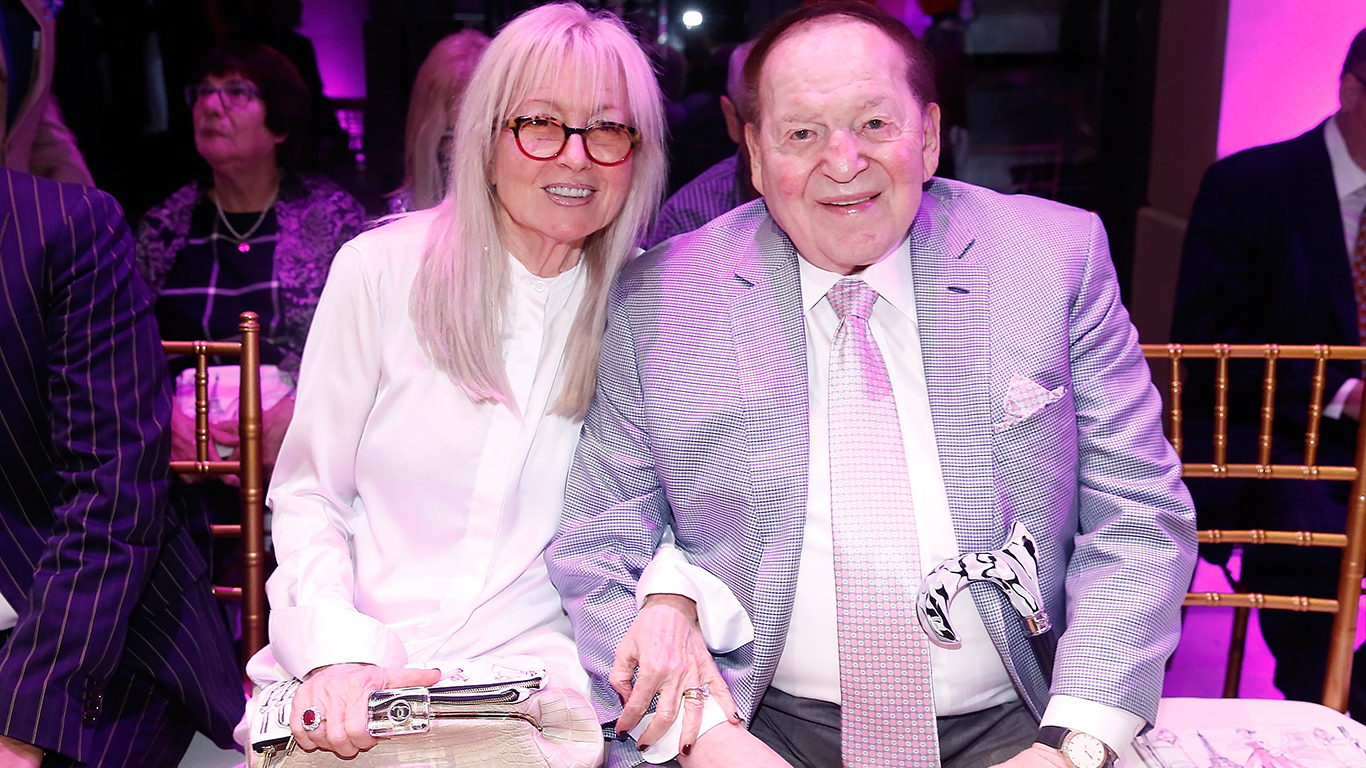
1. Sheldon G. & Miriam O. Adelson
> Total contributions Nov 9, 2016 — Oct 15, 2018: $87,762,600
> To Dems & Liberals: $0
> To Repubs & Conservatives: $87,742,600
> Companies: Las Vegas Sands Corp./Adelson Drug Clinic
Nobody else has come close to donating the amount of money that hard-right casino magnate Sheldon Adelson has poured into the current election cycle. The money he has been shoveling out to get Republicans elected in the midterms is piling up so quickly that the current data at the Center for Responsive Politics (opensecrets.org) is already significantly out of date. In October, Adelson added $25 million to his cause, making his total contributions for the current election not only a personal record of $113 million, but also the largest sum that any individual household has spent on one election cycle since the Citizens United Supreme Court decision in 2010.
A staunch supporter of President Trump, Adelson has channeled nearly half of his contributions into the Congressional Leadership Fund, the powerful GOP super PAC closely aligned to House Speaker Paul Ryan. He has also given $45 million to the Senate Leadership Fund, aimed at protecting and increasing Republican Senate seats.
Take This Retirement Quiz To Get Matched With An Advisor Now (Sponsored)
Are you ready for retirement? Planning for retirement can be overwhelming, that’s why it could be a good idea to speak to a fiduciary financial advisor about your goals today.
Start by taking this retirement quiz right here from SmartAsset that will match you with up to 3 financial advisors that serve your area and beyond in 5 minutes. Smart Asset is now matching over 50,000 people a month.
Click here now to get started.
Thank you for reading! Have some feedback for us?
Contact the 24/7 Wall St. editorial team.
 24/7 Wall St.
24/7 Wall St.
